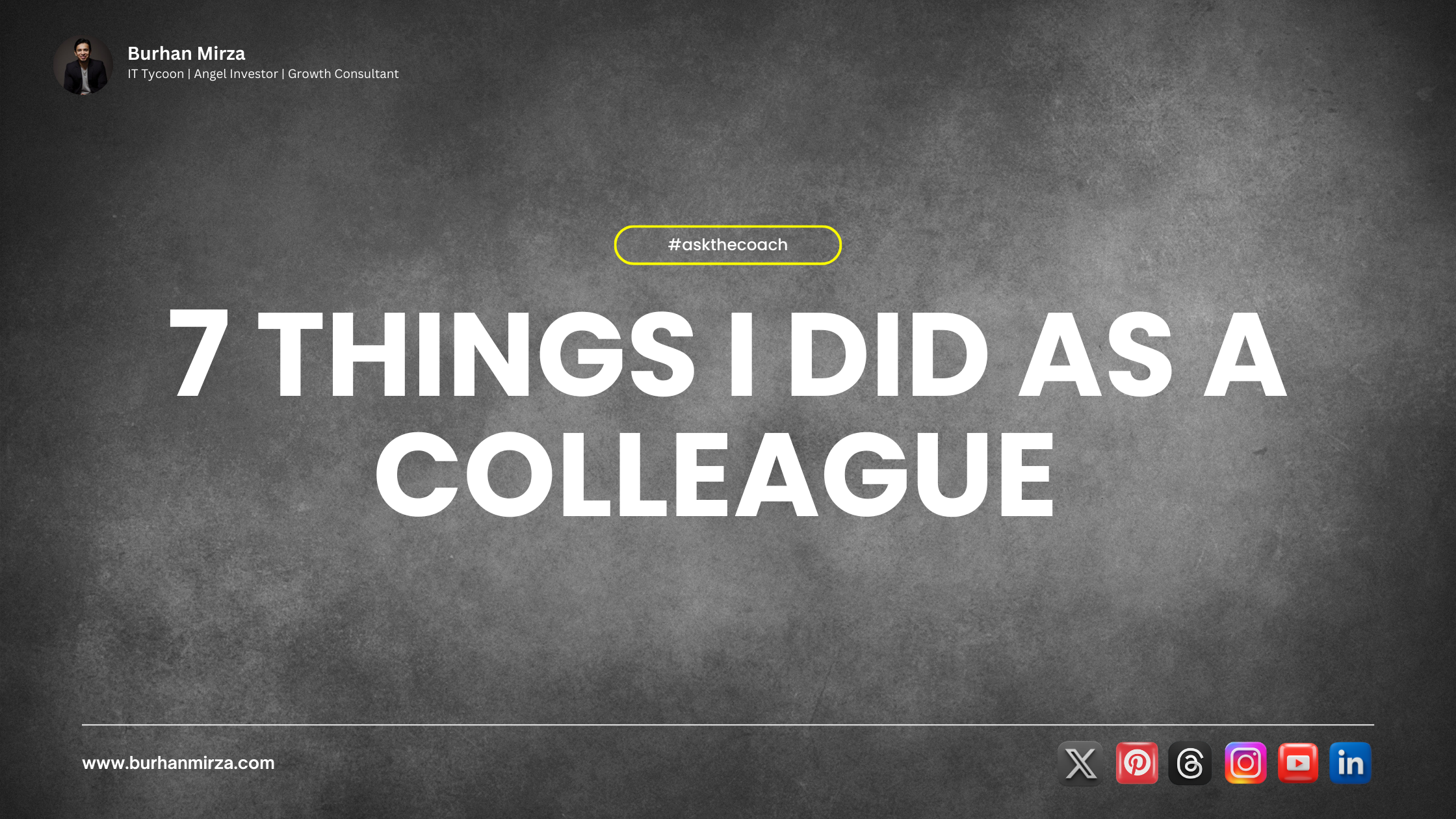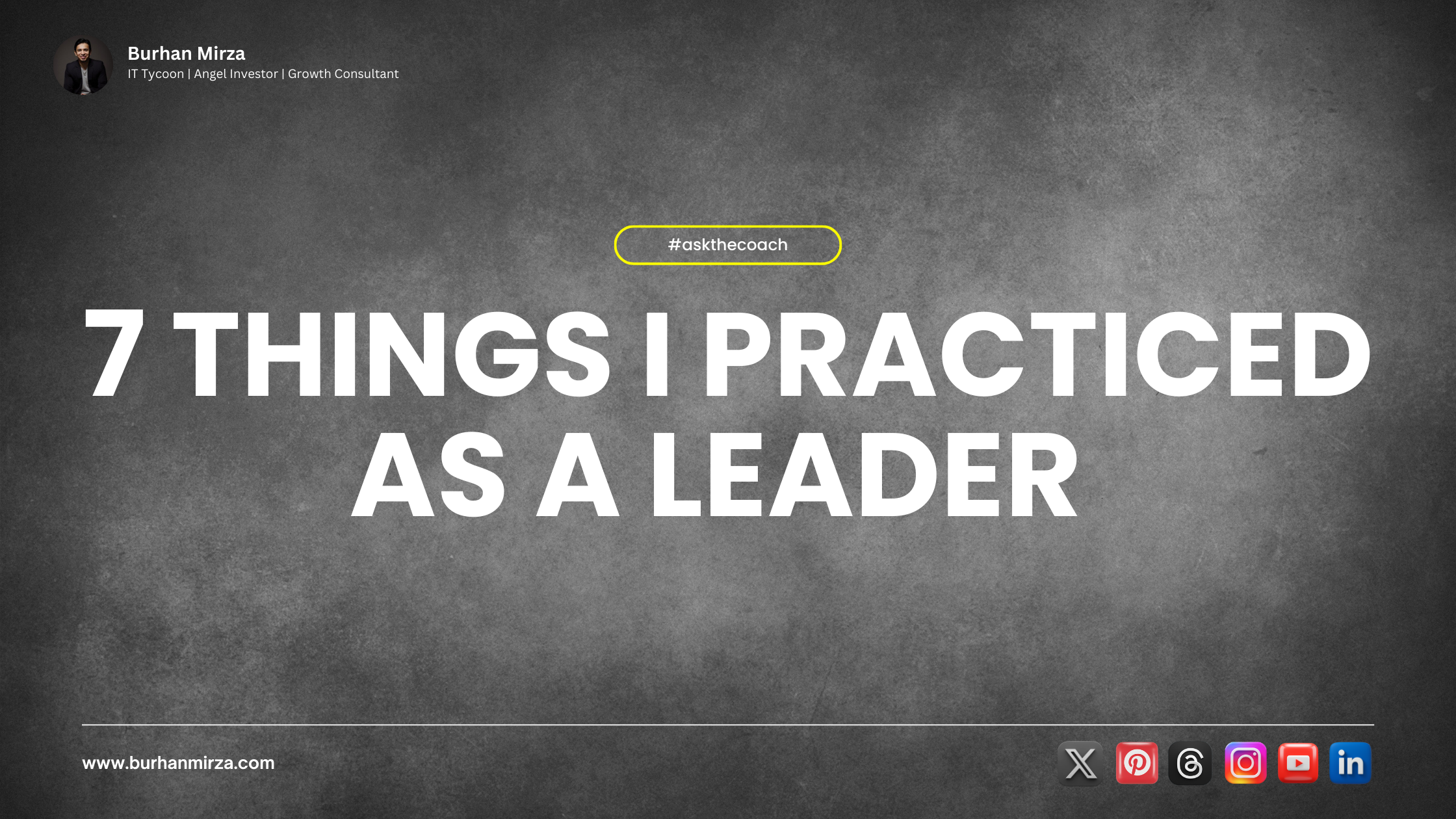 Blogs
Blogs
7 Things I Never Did as an Employee
Hey everyone,
So here’s my first piece of content for my 2025 commitment to writing and educating Pakistan’s youth. I have been an employee and know that managing work isn’t as easy as it seems. Some might argue that a 9-5 isn’t taxing but I’d like to say otherwise.
The job role of every employee in an organization is crucial. They are the building blocks of a successful company and if they don’t take their work seriously, I’d bargain about a company’s success or long-term sustenance.
Being in an employee's shoes I understood what needs to be done to achieve success. However, most of us don’t realize the importance of being a resource for a growing or established organization. Over the past decade, I have tried to decode what not to do at a workplace because all of us know what needs to be done.
Both as an employee and an entrepreneur I always strived to understand how to manifest efficiency and efficacy in my organization. So here are 7 things I never did as an employee that made me who I am today. I must say, that I rose the ranks in my workplace relatively faster than my peers and gained tremendous recognition. All of the things I never did as an employee are the founding principles of making Muhammad Burhan Mirza what he is today.
Things You Shouldn’t Do as an Employee
There are a lot of things that fall under organizational ethics that you shouldn’t do as an employee and I never did. If I were to stress on all of them, it would be a very very long video and blog. But I took the liberty to mention the top 7 things never to do as an employee to help you grasp the concept of corporate life.
1. Never Blamed Anyone for my Mistakes
“Nobody is perfect” - Muhammad Burhan Mirza
When I think back to teaching someone how to drive, I’m reminded of how our brains tend to work under pressure. Most new joiners in a company are so focused on not making mistakes that they ironically end up making even bigger ones. Our minds are naturally wired to fixate on a single target, and this hyper-focus can sometimes backfire.
Let me give you a simple example: Imagine I, Muhammad Burhan Mirza, am teaching someone to drive. I tell them, “Just don’t hit any oncoming cars.” Now, instead of concentrating on their own driving, their brain zeroes in on the oncoming traffic, trying to avoid a crash. With all that attention on what's coming at them, they’re way more likely to lose control of the car they’re actually driving. In the end, their intense focus on what not to do is exactly what causes the problem
Similarly, at workplaces, we train our minds to avoid making mistakes such as sending a typo in an email or forgetting our tasks. If we direct our focus and channel it to something positive, like writing a strong email body or taking notes of our daily tasks, we mitigate the chances of making any mistakes.
However, miscalculations or blunders are a part of learning and we all tend to make them at every point in our career. The worst thing you can do as an employee or a manager is not own up to them. The problem arises when we blame others for our mistakes - which creates a chain of miscommunication and moral degradation.
Owning up to your mistakes gives you an edge in the corporate life. If you’re caught missing tasks, the best response is to accept your mistake, apologize and commit to fixing it yourself without involving anyone else. This shows your sense of responsibility and integrity to the senior management and it plays in your favor.
2. Never Waited for Tasks - Took Initiative
“The way to bring about change is to be proactive and active.” - Octavia Spencer
Looking back on my career as an employee, I was never the type to sit around and wait for my line managers to hand me tasks. Instead, I made it a habit to actively seek out problems within the organization—whether they were within my own team or outside of it—and then work on solutions. My philosophy was simple: identify any issues that slowed down management or task delivery, come up with a plan to fix them, and make it happen.
Sure, I spent about 90% of my time focused on what fell within my job description. But I didn’t limit myself. I was always willing to cross department lines, communicate with different teams, and take on task management outside my usual scope. That willingness to go above and beyond is what led to my exceptional growth. Senior management started seeing me as someone who was eager to take charge and improve the organization’s efficiency.
I even sought out my supervisors and asked to be assigned tasks that I had identified as potential areas for improvement. Proactively working on these issues became my way of boosting operational efficiency. Honestly, finding problems isn’t as hard as it sounds. All it takes is thinking beyond your own job role and keeping an eye out for the little inefficiencies that, once fixed, can have a massive impact. These tiny improvements not only give you an edge but can also elevate the entire organization.
3. Never Raised an Issue Without a Solution
“Best are those who come up with a solution rather than talk about the problem” - Muhammad Burhan Mirza
As social animals, we naturally seek ways to communicate and collaborate for better results. But let’s be real—when we’re striving for perfection, we often hit roadblocks that hold us back from performing our best. So, what’s the usual course of action? Report the issue to senior management and wait for them to come up with a solution.
While this approach is actively practiced within organizations, I always took a different approach. I believe that no one understood the problem better than me - especially the senior management who wasn’t “directly” involved in my role.
As a sole custodian of the problem, I took it as my duty to raise an issue only when I have a solution. Now I am not saying your solution would be accepted. Most of the times, what I proposed was rejected. However, sharing a solution after sharing your issue gives you the role of a problem solver rather than a problem creator.
And this is one of the many things that I still practice and strongly believe that this habit alone made Muhammad Burhan Mirza what he is today. Because if I had kept myself glued to the problem and never tried to propose or come up with a solution, I never would have been capable of leading my business because as an entrepreneur 70% of my job description is to solve business problems. And when you climb the ladders, a problem-solving attitude is what senior management looks for.
4. Never Ignored Feedback
"Feedback is the breakfast of champions." – Ken Blanchard.
I think Ken Blanchard summarized my point pretty well here! And there’s a very good reason for never ignoring feedback. You see, feedbacks are genuine replies you collect from people who are directly associated with your performance.
Most of the time, we constantly make mistakes without realizing them. Feedback helps us shape our professional and personal lives. But more importantly, feedback helps us grow and become a better version of ourselves.
In my career, I’ve always been fond of receiving feedback on my work. Sometimes, my supervisors had positive things to say and sometimes, I received pretty hurtful words. Nevertheless, I wouldn’t say that negative feedback broke my morals or demotivated me. Instead, negative feedback helps shape Muhammad Burhan Mirza into what he is today.
If everyone had simply given me a pat on my back and told me to shrug it off, I wouldn’t have learned and become flexible. Today, I am lean and adaptive to my environment because I have learned to adjust to feedback and use it as a powering mechanism.
5. Never Chased Titles
“The company pays the job that you do, not you, not your title.” - Muhammad Burhan Mirza
I never ran after titles and recognition. My biggest competition was my past self and always learned from people better than me whether they were high or low in the hierarchy. This gave me an all-rounder characteristic where everyone felt comfortable talking to me and enabled me to learn more about other fields of work.
I believed in increasing my job role rather than my title because I knew I was getting paid for the work I delivered. This one time, I switched a job to a lower designation and I did not let it affect my integrity or status. I still worked like I did and rose the ranks faster than my peers.
6. Never Avoided Challenges
"Challenges are what make life interesting, and overcoming them is what makes life meaningful." – Joshua J. Marine
Never ever, run away from challenges in life. Whether your facing backlash in your personal or professional life, never surrender, never give up. There can be different kinds of challenges in your professional life. Sometimes, your team isn’t performing and sometimes you’re lagging a bit.
Overcoming these challenges will give you a sense of fulfillment and achievement. Be the man on the front foot. Don’t wait for others to help you in facing your demons. Remember, it’s you against the world.
7. Never Waited for Recognition
“Be a force in yourself” - Muhammad Burhan Mirza
Some might disagree with me on this, but I was never someone to wait for recognition or work for recognition. My work ethic was simply to do better than myself and become a better version of my past self.
If you tie yourself to the chains to appreciation, your performance will depend on what others say. Free yourself from this mentality and you’ll eventually get to your destination. Yes sometimes, appreciation sounds uplifting, but it sounds better when you earn it and not when you ask for it. Work hard and you’ll be recognized, even if you don’t WORK HARDER, and you’ll reap the reward eventually, be it in your current or next workplace!
So these are the 7 things I never did as an employee. They worked out for me and you can see that. I hope they work out for you. This is Muhammad Burhan Mirza - signing off and living up to my 2025 resolution! See you in my next blog!
 Muhammad Burhan Mirza
Muhammad Burhan Mirza My Story
My Story Events
Events Social Highlights
Social Highlights Books
Books Blog
Blog Press Kit
Press Kit  Contributions
Contributions 

